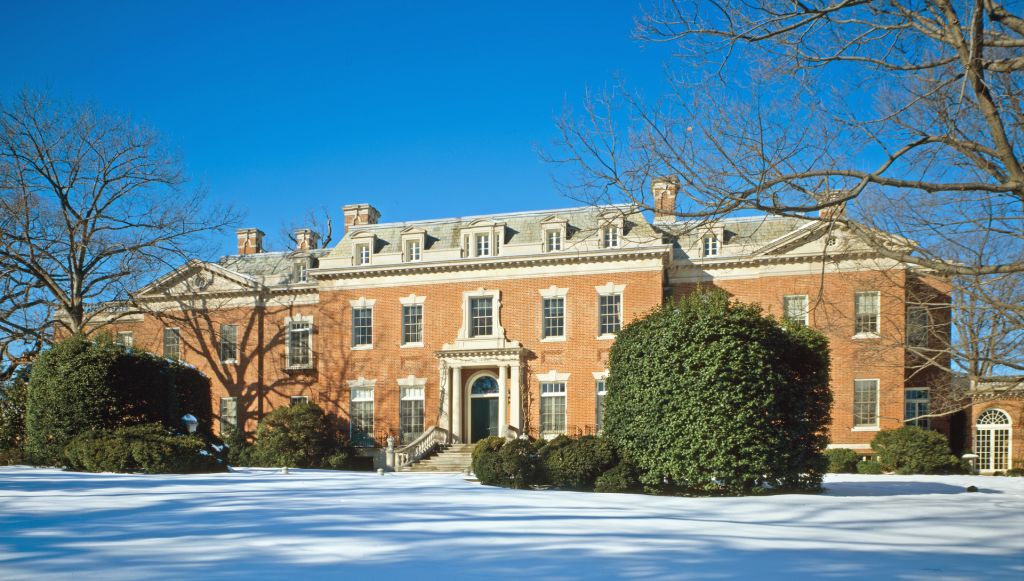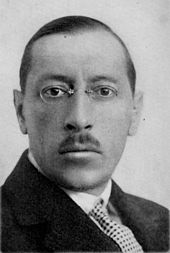BY NATHAN CRANFORD
This weekend at Davies Symphony Hall, principal conductor Michael Tilson Thomas will be handing the baton to young Spanish conductor Pablo Heras-Casado, who will be leading the San Francisco Symphony in a diverse evening of music by 20th-century composers from Russia, France, Italy and Spain.

(The Dumbarton Oaks Mansion in Washington D.C.)
 The night begins with a performance of Igor Stravinsky’s neo-classical Concerto in E-flat, more popularly known as “Dumbarton Oaks.” The work was named after the beautiful (and now historical) Washington D.C. estate of Robert and Mildred Bliss, who commissioned Stravinsky (left) to write the piece for their 30th wedding anniversary. Like much of Stravinsky’s works composed during this period, one immediately hears the direct influence of Baroque and Classical era composers such as J.S. Bach and W. A. Mozart. However, the music is shrouded in the jagged modernist style Stravinsky had come to be known for. The concerto is written for a small chamber ensemble comprised of woodwinds and strings–an unorthodox mix of instrumentation which is also a hallmark of Stravinsky’s neo-classical period.
The night begins with a performance of Igor Stravinsky’s neo-classical Concerto in E-flat, more popularly known as “Dumbarton Oaks.” The work was named after the beautiful (and now historical) Washington D.C. estate of Robert and Mildred Bliss, who commissioned Stravinsky (left) to write the piece for their 30th wedding anniversary. Like much of Stravinsky’s works composed during this period, one immediately hears the direct influence of Baroque and Classical era composers such as J.S. Bach and W. A. Mozart. However, the music is shrouded in the jagged modernist style Stravinsky had come to be known for. The concerto is written for a small chamber ensemble comprised of woodwinds and strings–an unorthodox mix of instrumentation which is also a hallmark of Stravinsky’s neo-classical period.
Following the performance of Stravinsky’s “Dumbarton Oaks” Concerto, Georgian pianist Khatia Buniatishvili will perform French Impressionist composer Maurice Ravel’s famed Piano Concerto in G-major. Like Stravinsky’s “Dumbarton Oaks” Concerto, Ravel’s Piano Concerto draws heavily from the crisp simplicity of Baroque and Classical forms, infused with the impressionistic sounds of the whole-tone scale, experimental rhythms, and jazz. The concerto is also heavily influenced by the traditional Basque music of Ravel’s youth, which adds a sort of mysterious aura to an intensely modern and cosmopolitan piece of music. This concerto remains one of the composers most oft-performed works for piano and orchestra.
Next, a work by Italian composer Luigi Dallapiccola entitled Piccola musica notturna will be performed. Like both works that came before, Dallapiccola’s work has a great affinity with the Classical form. In fact, the title of the song translates exactly as “A Little Night Music,” which is a direct allusion to Mozart’s work of the same name, Eine Kleine Nachtmusik (in German). Unlike the two modernist works that head the program, Dallapiccola’s composition is completely atonal–relying upon the musically controversial “12-tone” system, which makes it incredibly difficult for the average listener of tonal music to digest. However, Dallapiccola stands as one of the few composers to be considered a master of this serial method of composition, and his work, like that of Mozart so many years before, retains an elegant architectural structure that keeps the music from becoming completely chaotic.
 The remainder of the evening will be dedicated to the music of the guest conductor’s homeland: Spain. Manuel De Falla’s (right) classic ballet, El amor brujo (or Love, the Magician) will be performed by Heras-Casado and the SFS along with the flamenco stylings of Marina Heredia as an accompaniment. The piece is heavily influenced by the music and dance of De Falla’s Andalucian heritage, and the story that accompanies the work resembles that of a Shakespearean drama, only in a distinctly Spanish setting. Listeners for the first time of the complete work may recognize one of the movements from the piece, namely the Danza ritual del fuego (or the “Ritual Fire Dance”), which is one of De Falla’s most recognizable pieces of music. You can see the “Ritual Fire Dance” performed on piano by the great pianist Artur Rubinstein below.
The remainder of the evening will be dedicated to the music of the guest conductor’s homeland: Spain. Manuel De Falla’s (right) classic ballet, El amor brujo (or Love, the Magician) will be performed by Heras-Casado and the SFS along with the flamenco stylings of Marina Heredia as an accompaniment. The piece is heavily influenced by the music and dance of De Falla’s Andalucian heritage, and the story that accompanies the work resembles that of a Shakespearean drama, only in a distinctly Spanish setting. Listeners for the first time of the complete work may recognize one of the movements from the piece, namely the Danza ritual del fuego (or the “Ritual Fire Dance”), which is one of De Falla’s most recognizable pieces of music. You can see the “Ritual Fire Dance” performed on piano by the great pianist Artur Rubinstein below.
http://www.youtube.com/watch?v=hocCPMDShig
The San Francisco Symphony has been known for pushing the boundaries when it comes to performing some of the most diverse selections in the classical music repertoire, and this weekend is no exception. All of the works showcased by guest conductor Pablo Heras-Casado are tied together by the strong connection they have with the strict Classical and Baroque musical forms of the 17th and 18th Centuries, while bringing to the fore certain aspects that make these works distinct artistic products of the 20th Century. However, listeners who are untrained in appreciating the often jarring sounds of 20th-century classical music should take heed that this weekend’s program will be an adventure in musical discovery–so set your expectations accordingly!
RELATED LINKS
San Francisco Symphony Official Website
Program and Tickets for This Event
Follow us on Twitter and like us on Facebook to give us a shout. You can also stay on top of exciting events from around the world by downloading the eventseeker app for iPhone, Android or Windows.
